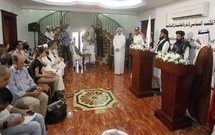 The much-touted, first-ever public negotiations between the United States and the Afghan Taliban, which were scheduled to commence June 20, hit a snag even before they began. The Afghan government decided to pull out of the talks, underscoring how difficult it will be for U.S. President Barack Obama's administration to get the Taliban to come to a power-sharing deal without undermining the fragile polity that the West has spent the last 12 years building.
The much-touted, first-ever public negotiations between the United States and the Afghan Taliban, which were scheduled to commence June 20, hit a snag even before they began. The Afghan government decided to pull out of the talks, underscoring how difficult it will be for U.S. President Barack Obama's administration to get the Taliban to come to a power-sharing deal without undermining the fragile polity that the West has spent the last 12 years building.
The United States was forced to backtrack after widely publicizing that it was going to enter into its first direct talks with a jihadist entity. The Obama administration's special envoy to Afghanistan and Pakistan was reportedly en route to Doha to meet with the representatives of Taliban chief Mullah Mohammad Omar in the group's political bureau, which was inaugurated June 18 by Qatar's deputy foreign minster. The State Department then announced late June 19 that no such meeting was scheduled. On the morning of June 20, there were reports that U.S. Secretary of State John Kerry telephoned Afghan President Hamid Karzai, assuring him that the Taliban flag had been removed from the newly opened office and that the sign on the building reading "The Political Bureau of the Islamic Emirate of Afghanistan in Doha" would be replaced by one simply reading "Bureau of Peace Talks."
The renaming of the office may seem trivial. But the words "Islamic Emirate" in the self-description of the Afghan Taliban have tremendous geopolitical significance. During the years that the jihadist movement ruled around 95 percent of the country, the Taliban regime referred to itself as the Islamic Emirate of Afghanistan; meanwhile the government, which was led by former Afghan President Burhanuddin Rabbani and recognized by the international community, was known as the Islamic State of Afghanistan and controlled only about 5 percent of the territory, near the border with Tajikistan.
Until very recently, the Taliban movement (despite the collapse of its regime in 2001) continued to insist that its regime was the legitimate ruling authority, fighting Western forces who had invaded the country and had propped up the Karzai-led state as a puppet authority. But two years ago, in his 2011 Eid al-Fitr communique in which he announced that his group had entered into talks with the United States, Mullah Omar shifted strategy and for the first time referred to the Islamic Emirate of Afghanistan as a non-state actor that did not seek to monopolize power and sought to form a coalition government with all Afghan stakeholders.
For Washington this was a major concession, which explains why the talks -- despite disruptions -- have progressed. But for the Karzai regime this is a nightmare scenario, especially as the Western-engineered Afghan state is approaching a historic succession in which Karzai, who has been synonymous with the post-Taliban Afghan regime, is due to step down. This is why, despite its previous agreement to join the talks in Doha, the Karzai regime has suddenly changed its position after seeing the Taliban's ability to gain international attention with the opening of their new office.
The Karzai government is already worried that it must prove its forces will be able to keep the Taliban at bay on the battlefield. It does not want the Taliban to make gains on the international diplomatic front with the opening of their new office and their stated aim of using the facility to enhance ties with other countries, international nongovernmental organizations and the United Nations. The United States obviously does not want to see the Afghan state, which cost so much to build, weaken -- hence the move to delay the talks and sort things out before moving forward.
But as Stratfor discussed before the start of the negotiating process two years ago, Washington is going to have difficulty balancing the two sides in what is essentially an Afghan civil war. When combined with the Pakistani and Iranian interests in Afghanistan, this problem becomes even more complex. With very little time left before the drawdown of NATO forces in Afghanistan and with security responsibility already in the hands of the Afghan National Security Forces, the Obama administration will have a hard time bringing the Taliban into the Afghan mainstream when the future of the mainstream itself is uncertain.
Courtesy : Stratfor (www.stratfor.com)